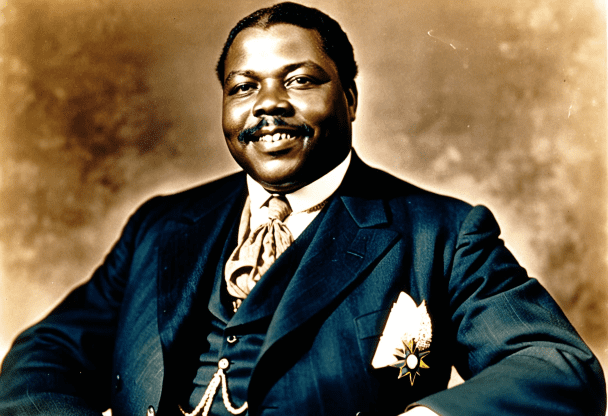What Marcus Garvey Really Stood For – And Why It Still Matters

When most people hear the name Marcus Garvey, they immediately picture the stern man on the “brawta money” (the $100 coin), staring deep into your soul like your grandmother when you touch her Sunday rice and peas before church done.
But trust me, Garvey was more than just a face on a coin or a quote in a school book. The man was a movement. A living, breathing, “big man ting” that made people sit up straighter and think deeper — even when dem did just want a likkle bun an’ cheese and peace of mind.
So let’s dive into what Marcus Garvey really stood for — and why in 2025, in the land of dutty wine, patties, and Parliament drama, his message still slap harder than a cold Red Stripe pon a hot day.
A Thinker With Swagger
Garvey wasn’t just a dreamer — he was a planner. Born in St. Ann, same parish as Bob Marley (big up di “legend-producing parish”), Garvey from early could see that Black people were getting the short end of the stick, or in Jamaican, “dem did get di dry biscuit every time.”
So what did he do? Cry? Roll over? Beg colonial masters? No sah. Garvey sharpened his intellect, tightened his necktie, and started one of the most powerful Black movements in history — the UNIA (Universal Negro Improvement Association).
His message? Own your value, control your destiny, and stop waiting for “massa fi throw yuh scraps.”
About That “Ship” Thing
Yes, you’ve heard it: Garvey built ships and told people to “go back a Africa.” But let’s not mix up jokes with history. The Black Star Line wasn’t some one-way cruise outta Jamaica. It was about Black people owning transportation and trade, not just being passengers in life.
In other words, Garvey was telling Black people: “Build yuh own ting. Nuh wait pon nobody fi come save yuh. Nuh be no hitchhiker pon Babylon highway.”
The ship was symbolic. It was about power, not passport stamps.
Business First – Before “Buy Black” Was Trendy
Before Instagram was selling lip gloss and empowerment, Garvey was out here building newspapers, encouraging small businesses, and printing pamphlets. He told people to shop from each other, build up their community, and stop giving all their money to outsiders who wouldn’t even give them “di time a day unless yuh come wid big US.”
If Garvey were alive today, him woulda seh:
“Support di man weh sell di peanut, not just di one weh own di gas station.”
He was serious about Black economic independence. And let’s be honest — in a world where even “box food price a raise like it waan reach heaven,” that message hit home even harder.
His Message Still Matters – Like Ackee in Saltfish
Here’s why Garvey’s message is still important:
- We still struggle with identity.
- We still grapple with colonial mindsets.
- We still ask foreign validation to confirm local greatness.
Garvey’s words — “Emancipate yourselves from mental slavery” — later made famous by Marley — still cut deep. He wasn’t asking for pity. He was demanding pride.
Or as Garvey would’ve said: “Mi nah beg fi recognition. Mi know mi worth.”
So What Can We Learn From Garvey Today?
Let’s be real. Garvey didn’t leave us a spaceship or a treasure chest, but he did leave us a blueprint:
- Value yourself.
- Build up your people.
- Buy local — from the woman in the market to the man making slippers outta tyre.
- Talk big, walk tall, and back it up — don’t just chant quote and post Garvey face every Heroes Day like him a meme.
Garvey was a serious man, yes, but if he were here, mi bet him woulda buss a laugh and seh:
“Mi neva fight fi yuh fi only look cute in African print pon Emancipation Day and den gwaan back fi bleach cream come Monday.”
Marcus Garvey wasn’t a perfect man, but he had a perfect mission: to make Black people “hold dem head high like coconut tree top,” know dem worth, and build something that could never be torn down by “di system or di selectors of oppression.”
His message is not dated. It’s not dusty. It’s not only for textbooks. It’s alive.
And as long as there are people proud to wear kente with creases, bun wid cheese, and a mindset of ownership, Marcus Garvey’s legacy will never lose its flavour — like a good Sunday oxtail wid gravy lick off di side.
So, big up yuhself, Mr. Garvey. Wi still a listen. Wi still a learn. And wi nah stop till wi build di empire yuh dream ‘bout — from yaad to abroad.
From di frontline of culture and conscience –
Dis was Di Yard Culture Watcher –



